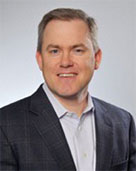
Karl Scheidt
Professor of Chemistry and of Pharmacology
Executive Director, NewCures Accelerator
Director, Center for Molecular Innovation and Drug Discovery
Enzyme telomerase is an important target for cancer researchers
One of the hallmarks of cancer is cell immortality. A Northwestern University organic chemist and his team now have developed a promising molecular tool that targets and inhibits one of cell immortality’s underlying gears: the enzyme telomerase.
This enzyme is found overexpressed in approximately 90% of human cancer cells and has become an important subject of study for cancer researchers. Normal cells have the gene for telomerase, but it typically is not expressed.
“Telomerase is the primary enzyme that allows cancer cells to live forever,” said Karl A. Scheidt, who led the research. “We want to short-circuit this immortality. Now we have designed a first-of-its-kind small molecule that irreversibly binds to telomerase, shutting down its activity. This mechanism offers a new pathway for treating cancer and understanding cellular aging.”
Scheidt is a professor of chemistry in the Weinberg College of Arts and Sciences and a professor of pharmacology at Northwestern University Feinberg School of Medicine.
The big idea for the small molecule design came from nature. A decade ago, Scheidt was intrigued by the biological activity of chrolactomycin, which is produced by bacteria and has been shown to inhibit telomerase.
Scheidt and his team used chrolactomycin as a starting point in the design of their small molecules. They produced more than 200 compounds over the years, and the compound they call NU-1 was the most effective of those tested. Its synthesis is very efficient, taking fewer than five steps.
“NU-1 inhibits telomerase unlike anything that came before it,” Scheidt said. “It does this by forming a covalent bond. Another advantage of NU-1 is that its molecular structure should enable scientists to add cargo, such as a therapeutic.”
The study was published last week by the journal ACS Chemical Biology.
All human cells have telomeres, short DNA sequences that cap the ends of each strand of DNA. Their job is to protect our chromosomes and DNA. When a cell divides, the telomeres get shorter until they can no longer do their job. Natural cell death follows.
In contrast, cancer cells, with their heightened telomerase activity, become immortal by reversing the normal telomere shortening process. The enzyme telomerase copies telomeres over and over again, lengthening the telomeres. The result is unlimited cell division and immortality. The famous HeLa cells, isolated from the cervical cancer tissue of Henrietta Lacks in the 1950s, are still dividing.
Telomerase has been a target for cancer therapeutics research for decades. In 2009, three scientists received the Nobel Prize in Physiology or Medicine for their earlier research into telomeres and telomerase.
After developing their new compounds, Scheidt and his team initiated collaborations with Professor Stephen Kron at the University of Chicago and Scott Cohen at the Children’s Medical Research Institute in Sydney to investigate the extra-telomeric role of telomerase inhibition.
The studies focused on how the new compounds interact with telomerase on a molecular level and how telomerase inhibition sensitizes cells to chemotherapies and irradiation. From this work, NU-1 rose to the top.
“By publishing this study, we are test driving this exquisite tool to see what it can do and to learn more about telomerase,” Scheidt said. “We also are continuing to make it better.”
The research was done in human cells. The next steps, Scheidt said, are to make more potent compounds and investigate them in animal models.
The study was supported by the Chicago Cancer Baseball Charities at the Lurie Cancer Center of Northwestern University, the National Institute of General Medical Sciences (training grant GM105538) and the National Institutes of Health (grant R01 CA217182).
The paper is titled “Targeted Covalent Inhibition of Telomerase.” Scheidt is the corresponding author; Rick C. Betori, who recently received his Ph.D., is the first author; and Kron and Cohen are co-authors.
Northwestern has filed a provisional patent for NU-1 and related analogs.
Scheidt also is director of Northwestern’s Center for Molecular Innovation and Drug Discovery; the executive director of NewCures, Northwestern’s biomedical accelerator; a member of the Robert H. Lurie Comprehensive Cancer Center of Northwestern University; and a member of the Chemistry of Life Processes Institute.

Professor of Chemistry and of Pharmacology
Executive Director, NewCures Accelerator
Director, Center for Molecular Innovation and Drug Discovery